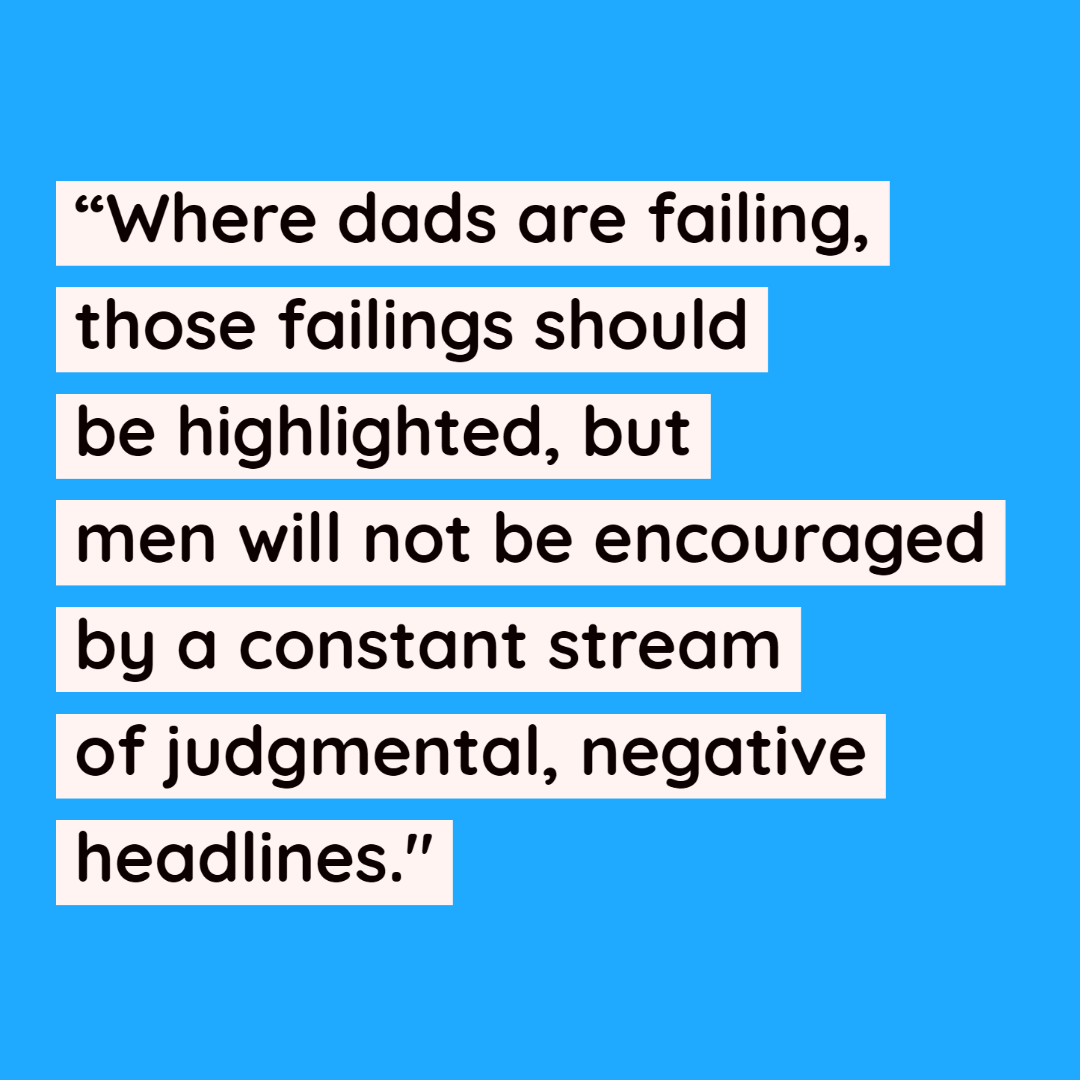What is the truth about dads failing to do their fair share of childcare and household chores since the Coronavirus pandemic struck? I’ve seen a lot of reporting on this subject, much of it suggesting men have either been doing much less than women or, worse still, being furloughed and sitting around watching Netflix as mum does all the homeschooling, kidmin and domestic chores while also holding down a job.

It’s an easy headline. Alas, I’ve read just a few too many news stories and opinion pieces stating this as fact.
Over the past few months I think we’ve seen something amazing take place in terms of gender roles within heterosexual couples (see note below re same sex couples). There’s more to do, a lot more, but there’s been a big step in the right direction. I feel this is being overlooked and we should have a more positive discussion about the changes we have seen and how we can improve them further.
There is increasing evidence of positive change in many households. We need to see these changes made permanent and improve upon them.
What has NOT happened
Let’s be absolutely clear about what I am saying. Mass working from home and the furloughing of huge numbers of full-time working fathers has not created a world where genuine gender-equality is the norm.
Various studies have overwhelmingly shown that the amount of domestic work carried out by women increased courtesy of COVID-19. Not all men have risen to the challenge and shared that work with mum. Those that have are, for the most part, doing less than their female partners.
I have also personally heard a few horror stories. I heard of one home-working man telling his wife it was “embarrassing” to ask his boss if he could amend his work hours slightly to accommodate childcare. I hear of dads commandeering a room in the house and hiding themselves away, putting paid work above everything else.
This Guardian article, published on 16 March, 2020 made some very strong assertions about what was happening in many homes (the article, published so early in the pandemic, was seemingly researched with the help of a crystal ball).
There’s a definite disparity in many households. Nonetheless, there are many reasons to be optimistic. I want to explain why.
The positive impact on home life
Many academic institutions and other interested parties are researching the impact on working parents. Several months after COVID-19 knocked planet Earth off its axis, a clearer picture is emerging of the impact on both genders.
As an aside, there is a lack of research on how same sex couples have been impacted by the pandemic. I’d like to think that someone, somewhere is looking into this, but at the moment it seems to be unchartered territory.
Getting back to the matter in hand, one of the most interesting pieces of information to bubble to the surface has come from the University of Birmingham and University of Kent, both of which jointly produced the Working From Home During COVID-19 report.
I simply can’t do this fascinating piece of research justice in one blog post. I’ll stick to a couple of higlights. Firstly, no surprises, it concluded the domestic burden has fallen more heavily on women. Nonetheless, here’s a direct quote from the research:
“Fathers have become more involved in childcare and unpaid work at home during lockdown, particularly those who took more than the two weeks statutory paternity leave when their child was born or adopted.”
While it doesn’t explicitly say as much, that comment would appear to be a reference to Shared Parental Leave, the system introduced in 2015 giving new parents the ability to share 50 weeks of leave when they have a child. SPL has been widely derided because of the low number of men that exercise their right to the leave (something of an unfair assertion but again, that’s an entirely different blog post).
For all the criticism SPL has received, it seems COVID-19 has shown that it has a part to play in improving gender equality within the home. Men who take SPL are getting more deeply involved with their kids from day one and they are staying involved. Such a statement shouldn’t be buried in a piece of academic research, it should be highlighted and the positive impact of SPL among the small number of men who take it very publicly heralded as a success.
Moving on, VitaMinds is an NHS mental health therapy service. It recently surveyed 2,000 parents about working from home during the ‘back to school’ season. The survey found that mums and dads were likely to spend the equivalent of two additional days a month on the school routine thanks to the Coronavirus pandemic.
This time would be spent washing uniform, dealing with staggered drop of and collections and stepping in to deal with the lack of wrap-around childcare. In total, it worked out at around 46 minutes a day.

The finer detail of this survey was very interesting. Again, mums seemed to be doing more of this work, but 40% of men said they are having to spend up to an additional hour a day managing this kidmin with half of the men surveyed saying they were feeling “overwhelmed” by the situation.
This is where it gets really interesting. Although men have a dreadful reputation for looking after their mental health, 28% of dads said they were blocking time out for themselves, something only 19% of mums were doing. Where men were taking some time out for self-care, 24% practiced yoga or meditated.
It’s essential to take a balanced view of this. It’s quite possible that mums weren’t taking time out for themselves because they were swamped with kidmin, housework and paid work for employers. Even so, 40% of dads were claimed to be taking on a large part of this burden and some of them realised they were having an issue coping so actually doing something about it. This flies in the face of conventional wisdom and is further evidence of change.
This comes on top of other studies revealing huge change in the nation’s households. The Parents in the Pandemic research is being led by Dr Jasmine Kelland of the University of Plymouth. I recently interviewed Dr Kelland about her work. She said analysis was in its early stages, but said her research suggested traditional gender roles had been “eroded” by the effects of families living, working and spending so much time together since March.
The Fatherhood Institute also published some research, based on Office of National Statistics data, showing the amount of unpaid childcare undertaken by men had increased by 58% since the introduction of lockdown. The Fatherhood Institute concluded that men were doing more at home because the pandemic had given them greater access to homeworking and reduced their work hours (specifically time spent travelling to work).
Let’s at least acknowledge the positives
Evidence is steadily piling up that the pandemic has led to positive change within many British households. Again, uncomfortable truths do need to be addressed: The domestic burden has disproportionately fallen on women in many homes. There are also men out there, I’d like to think small numbers, who simply don’t think domesticity falls within their remit.
It’s also true that guys are increasingly doing more at home. The changes in work patterns and lifestyle bought about by the COVID-19 lockdown seems to have proven that working culture and entrenched gender stereotypes were holding guys back.
Increased flexible, homeworking means many fathers are around more for their families. When many people are working from home, presenteeism in the workplace becomes less of an issue for dads to contend with.
When such fatherhood forfeits are less of a challenge, dads do more at home with their families. Added to that, the Working From Home During COVID-19 project has shown us why it’s vital to for dads to be involved with their children from the very earliest stages and that SPL is an important route to achieving that.
Not only that, but the increased involvement of men at home has happened in a period of months. While COVID-19 has been enormously destructive, one wonders how long it would have taken to get to where we are if it hadn’t happened.
Where dads are failing, those failings should be highlighted, but men will not be encouraged by a constant stream of judgmental, negative headlines. We need to recognise and acknowledge the positive changes that have taken place over recent months and build on them so men continue to do more at home, are more involved with family life and take on a fair share of the domestic work often carried out by female partners.
What is your opinion? Do you think men’s contribution has been overlooked? Do you think we will slowly slide-back to pre-COVID work patterns or maybe you are a mum and taken on a greater domestic burden? Maybe you optimistic that society may change permanently and for the better? Leave a comment below with your thoughts.






